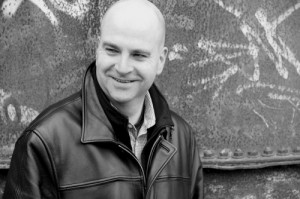Friday Five: Darryl Dash
 I’m privileged to chat today with my good friend, Darryl Dash. I first met Darryl after finding his excellent blog. Then we had some email correspondence. Finally, we had the chance to meet face to face when I visited Toronto for a media appearance last year. As a young pastor, I was grateful to learn from his experience.
I’m privileged to chat today with my good friend, Darryl Dash. I first met Darryl after finding his excellent blog. Then we had some email correspondence. Finally, we had the chance to meet face to face when I visited Toronto for a media appearance last year. As a young pastor, I was grateful to learn from his experience.Darryl is a pastor and blogger and, most recently, a church planter at the newly formed, Liberty Grace Church in Liberty Village, Toronto. He previously served as pastor of Richview Baptist Church and Park Lawn Baptist Church, both in west Toronto. Darryl is married to Charlene and has two children, Christina and Josiah.
When did you first discern the call to pastoral ministry?
I think I was only 6 or 7 years old. I would force my sister, age 4, to sit down and listen to my sermons. There’s one surviving cassette tape of my preaching from this era, but I don’t hate anyone enough to force them to listen to it.
As a young adult, I really wanted to dismiss this call as a childish thing, but I couldn’t shake it. My church affirmed the call to pastoral ministry, and I began the process of studying and getting some practical ministry experience.
You were successfully pastoring a growing church in Toronto. What would prompt you to leave this “safe” ministry and plant a church in an unchurched community in Toronto?
Twenty years ago I never heard much about church planting, so I didn’t even consider it. That began to change in the past ten or so years, but I figured that planting is for twenty-year-olds and not me. I remember reading Tim Keller’s article “Why Plant Churches?” and wishing that I could plant a church. I also remember sitting around a table with other pastors. Four were church planters; two of us weren’t. The four who planted had growing and thriving ministries, and the two of us who weren’t felt like we weren’t getting the traction we needed.
When I began to sense that it was time to make a transition, I looked at a few options. I could have gone to another established church, and I could have taught at a seminary, or I could church plant. I took a church planter assessment and was accepted. The more we talked to church planters, the more we sensed that this is what God is calling us to do. I thought of taking a safer option, but knew that it would be for all the wrong reasons.
I have to be honest: I’m not the typical church planter. I’m in my 40s. I probably don’t fit all the personality profiles. I’m not a rock star. But we have an inescapable sense of call that’s been confirmed by others. I’m learning to trust God in new ways.
Is there something that makes ministry in Canada, specifically Toronto, unique as opposed to other areas of North America?
In some ways, Toronto is like everywhere else. I like what Lloyd-Jones wrote: you don’t have to become a miner to know what miners need. We’re all the same in the end. People in Toronto have all the same needs as people who live anywhere else.
On the other hand, Toronto is a tough place. I know of someone who lived in New York and then moved to Toronto for a year. He would often invite people to come to church with him. In New York, ten people a year accepted his invitation and attended church. In Toronto, he couldn’t find one person to accept his invitation. Someone’s said that Toronto makes Seattle look like the Bible belt.
Frankly, I like it. People don’t pretend to be Christian. The only exception to this would be recent immigrants, who are more receptive to the gospel. The need here is real, but Toronto is not fertile ground. Apart from the Spirit, we’d be sunk.
What has been the most surprising aspect of church planting in your short experience?
I’ve been surprised by the level of spiritual attack. I should have expected it, but I didn’t. I’ve had more spiritual attack in six months of church planting than in ten years of pastoring an established church. That surprised me.
I remember Justin Buzzard saying that God seems to break church planters the year before they plant a church, or the year after. It turns out that seems to be right.
You’re also a frequent blogger. How does blogging intersect with your ministry and vice-versa?
Blogging helps me think about the issues of life and ministry in light of the gospel. It’s also a discipline in my life, like working out and reading. When I stop blogging, it’s usually a sign that I’m not being as disciplined as I need to be.
The best part about blogging is that it builds relationships. I’ve met people through the blog that have become friends, and they’ve enriched my life greatly. That is, by far, the best part about blogging. Just this morning, a pastor-friend reflected on reading my blog for the past five or six years. He commented on the trajectory of my life and ministry, and encouraged me. It’s hard to beat that.
Posted in Friday Five
